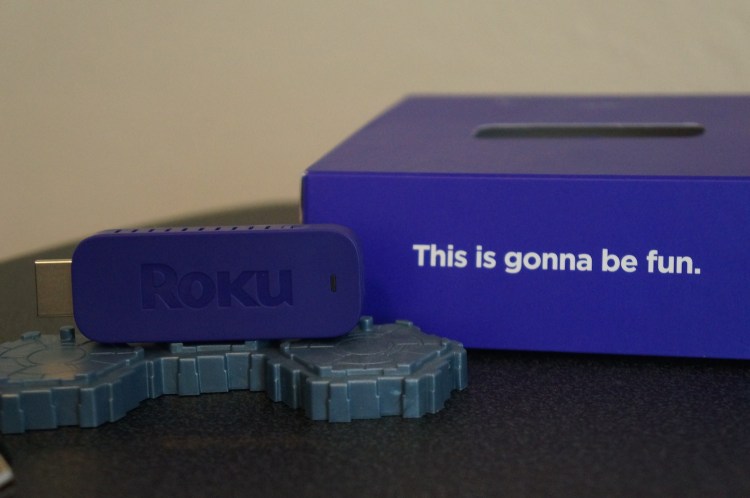There’s much discussion in the TV industry about the second screen experience. It’s a great way to capitalize on people who are already tinkering with their smartphones and tablets while a program is playing on TV.
The new generation of streaming media devices are taking advantage of this behavioral trend with a feature called screen casting — the ability to send what’s on your smartphone screen to your TV.
Apple TV’s AirPlay feature offers a very basic form of screen casting that’s essentially just mirroring whatever is on your phone. Google’s Chromecast only works for mobile apps with screen casting support, which is cool because your phone becomes the TV remote but also potentially annoying since there’s no menu screen to navigate through if your phone dies, breaks, or is otherwise nowhere near you.
And then there’s Roku’s latest offering, the updated Roku Stick, which is a happy medium between Apple TV and Chromecast. It’s perfect for those who are curious about using screen casting but aren’t ready to give up the familiar process of navigating through a menu screen with a remote.
For $50, you get an HDMI stick about the size of a lighter that offers all the functionality of Roku’s other set-top boxes as well as the ability to screen cast supported services. Plus, you still get a standard remote control.
The good: Easy to use and no sacrificing
When you buy the Roku Stick, you’re essentially getting a streaming device that works just like Roku’s other set-top boxes. The user interface is very easy to navigate through, and there are over 1,500 third-party apps (Roku calls them channels) you can download, which is more than any other streaming device.
Setting up the Roku Stick will be pretty easy for most people. You insert the device into an available HDMI slot and connect the power cord to the TV’s USB input. (It also comes with an AC adapter if you’d rather plug into the electrical outlet.) The device turns on automatically and then prompts you to either log in with a Roku account or create one if you’re new to Roku. Connecting to your Wi-Fi network is also pretty straightforward and quick.
If you’ve used another of Roku’s devices in the past, you’ll be able see all the Roku channels that were previously downloaded. Sadly, you will still need to log in to each of the third-party services, which does take some time.
It’s also worth noting that I wasn’t able to use the screen casting feature on the Netflix iPhone app until I logged into my Netflix account via Roku. After that, all I had to do was click the “casting” button on the Netflix mobile app to turn my smartphone into a useful remote.
Again, because the Roku Stick doesn’t force you to sacrifice the traditional set-top box experience, you’ll also get to use a standard remote, which is nice for channels like the TWC TV app where you have the option of “flipping” through stations.
The Roku Stick is reasonably priced at $50, which is less than an Apple TV ($100) but more than a Chromecast ($35).
The bad: Few screen casting apps & a lazy remote
Judging from this gadget, Roku understands that screen mirroring is a new trend that needs time to build before non-tech-savvy folks start using it. Unfortunately, that means third-party app makers are slow to add screen mirroring features.
Right now, the Roku Stick’s only compatible apps are Netflix and YouTube. If screen mirroring apps are a big selling point for you, the Roku Stick might not be your cup of tea. Roku Stick doesn’t have a built-in web browser, nor does it support screen casting from mobile or desktop browsers the way that Chromecast can do with Google’s Chrome browser. This is purely a device for consuming content, not showing off slideshow presentations on your office’s conference room TV.
If you plan on using the Roku Stick primarily as a set-top box, the responsiveness of the remote control may annoy you. If it’s inactive for a while, the remote will go to “sleep.” When you press a button it wakes up, but it takes a few seconds to carry out the action. This caused me to press the same button twice on several occasions, and sometimes caused whatever channel I was watching to close. It’s annoying, but if the Roku Stick is your primary streaming device, you may get used to it after a while.
Another issue I had with the remote was accidentally hitting the featured hot buttons. The remote comes with four hot buttons that instantly pull up corresponding Roku channels for Netflix, Amazon Instant, Blockbuster, and M-Go. This isn’t really a new gripe, as Roku has always included hot buttons on its low-cost devices’ remotes.
Finally, the stick itself might be an issue for TVs that only have HDMI inputs on the back of their TV sets — specifically if your TV set is mounted to a wall.
The verdict: a worthwhile purchase for the screen-cast curious
The Roku Stick is a solid device for anyone who wants an affordable way to enjoy streaming media services. And like other Roku streamers, this one works without much fuss, making it ideal for non-tech-savvy people. I would easily deem the Roku Stick parent-friendly.
Presumably, streaming services will evolve by focusing more on screen casting and using mobile devices in conjunction with TVs. The Roku Stick is an affordable streaming device that should stay useful well into the future.









